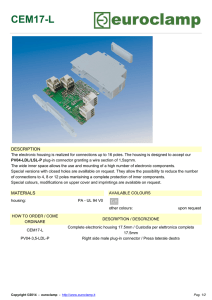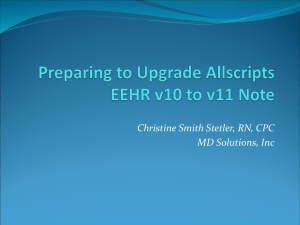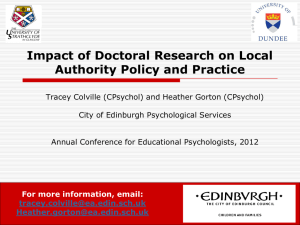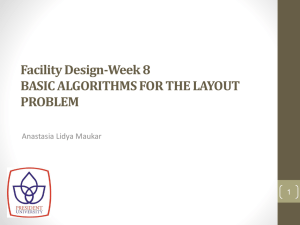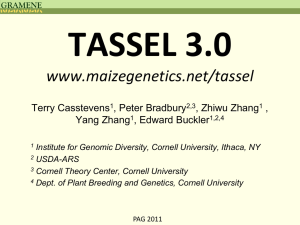Programme Advisory Group ToRs
advertisement
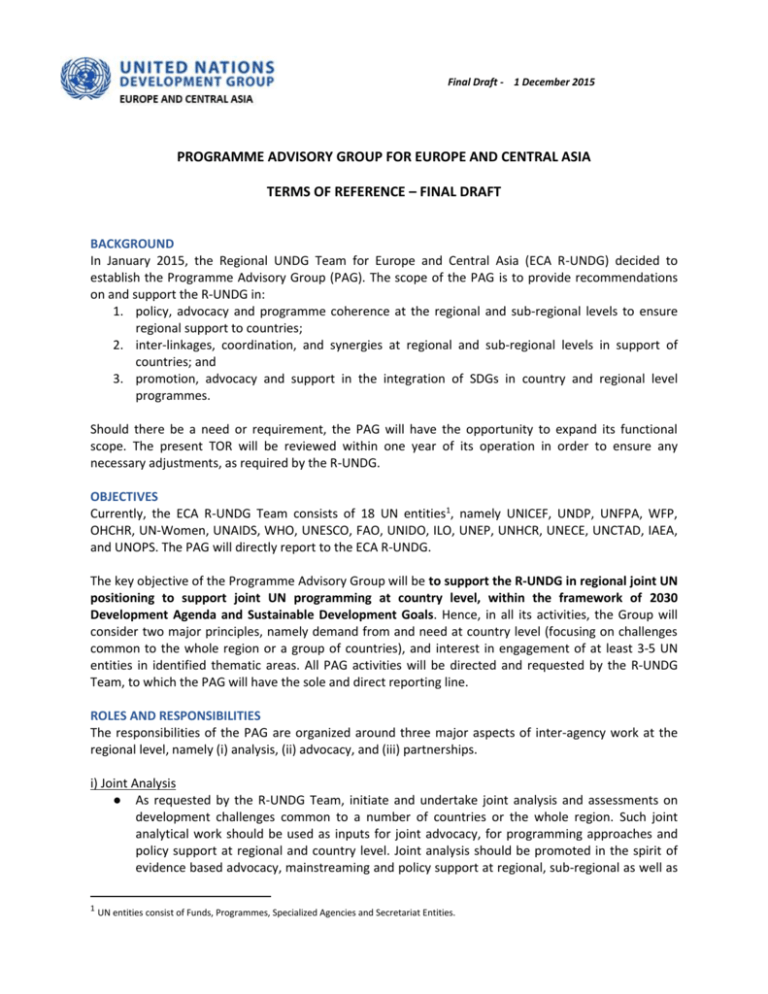
Final Draft - 1 December 2015 PROGRAMME ADVISORY GROUP FOR EUROPE AND CENTRAL ASIA TERMS OF REFERENCE – FINAL DRAFT BACKGROUND In January 2015, the Regional UNDG Team for Europe and Central Asia (ECA R-UNDG) decided to establish the Programme Advisory Group (PAG). The scope of the PAG is to provide recommendations on and support the R-UNDG in: 1. policy, advocacy and programme coherence at the regional and sub-regional levels to ensure regional support to countries; 2. inter-linkages, coordination, and synergies at regional and sub-regional levels in support of countries; and 3. promotion, advocacy and support in the integration of SDGs in country and regional level programmes. Should there be a need or requirement, the PAG will have the opportunity to expand its functional scope. The present TOR will be reviewed within one year of its operation in order to ensure any necessary adjustments, as required by the R-UNDG. OBJECTIVES Currently, the ECA R-UNDG Team consists of 18 UN entities1, namely UNICEF, UNDP, UNFPA, WFP, OHCHR, UN-Women, UNAIDS, WHO, UNESCO, FAO, UNIDO, ILO, UNEP, UNHCR, UNECE, UNCTAD, IAEA, and UNOPS. The PAG will directly report to the ECA R-UNDG. The key objective of the Programme Advisory Group will be to support the R-UNDG in regional joint UN positioning to support joint UN programming at country level, within the framework of 2030 Development Agenda and Sustainable Development Goals. Hence, in all its activities, the Group will consider two major principles, namely demand from and need at country level (focusing on challenges common to the whole region or a group of countries), and interest in engagement of at least 3-5 UN entities in identified thematic areas. All PAG activities will be directed and requested by the R-UNDG Team, to which the PAG will have the sole and direct reporting line. ROLES AND RESPONSIBILITIES The responsibilities of the PAG are organized around three major aspects of inter-agency work at the regional level, namely (i) analysis, (ii) advocacy, and (iii) partnerships. i) Joint Analysis ● As requested by the R-UNDG Team, initiate and undertake joint analysis and assessments on development challenges common to a number of countries or the whole region. Such joint analytical work should be used as inputs for joint advocacy, for programming approaches and policy support at regional and country level. Joint analysis should be promoted in the spirit of evidence based advocacy, mainstreaming and policy support at regional, sub-regional as well as 1 UN entities consist of Funds, Programmes, Specialized Agencies and Secretariat Entities. Final Draft - 1 December 2015 ● ● country levels. Before initiating new analytical work, the PAG will take stock of existing analytical work either within individual agencies or at country level. The PAG may choose to request a relevant regional inter-agency thematic group to conduct such analytical work. Joint analytical work should be in line with cross-sectoral linkages within the 2030 sustainable development agenda and SDGs, and based on multidisciplinary approach. Within identified areas, facilitate sharing of data and analytics developed by individual agencies among PAG members and the ECA R-UNDG. In other areas, wherever possible and feasible, share technical and operational resources such as expert and institutional databases, researches and analyses, etc. ii) Joint Advocacy ● Building on countries’ needs (either the whole region or a group of countries, for example within a sub-region) and as requested by the ECA R-UNDG, identify and propose to the ECA R-UNDG key thematic areas requiring joint UN advocacy and engagement at the regional and country levels. ● Develop and propose common approaches to facilitate joint UN advocacy and messaging within agreed thematic areas. ● Develop and contribute to joint UN advocacy products and events within the thematic areas identified. ● Create regional advocacy platform on SDGs anchored in human rights, equality and universality principles of the 2030 sustainable development agenda. iii) Partnerships ● Within the framework of the 2030 sustainable development agenda, and especially in light of the emerging initiative to establish issue-based coalitions/networks, facilitate broader “thematic” partnerships with development actors (at local, regional and international levels) on the selected issues. Issue-based coalitions/networks will be virtual and will be maintained by agencies leading in identified focus areas. ● Develop and present to the ECA R-UNDG common approaches and guiding principles on partnerships in the region - both traditional and new partnership models within SDG agenda thus facilitating common approaches at country level too. This will support positioning the UN at the regional level as One UN vis-à-vis key strategic partners. ● Where necessary (and in light of joint advocacy aspect), contribute to ECA R-UNDG regional activities aimed at strengthening UN partnerships within identified focus areas. ● Facilitate sharing of information, good and less successful practices in terms of partnership building. Share lessons learnt with the ECA R-UNDG. ● Share information about and jointly map potential partners at the regional level – for assessing the opportunities of joint work with them. ● Potential areas for strengthened coherence, namely resource mobilization and SouthSouth/Triangular Cooperation, will be considered by the PAG (i) within specific focus areas, as needed, and (ii) in more broader terms, after a self-review of PAG functioning. MEMBERSHIP The ECA Programme Advisory Group is composed of Regional Programme Coordinators/ Managers and alike from agencies, which are represented in the ECA R-UNDG Team. Depending on the substance and Final Draft - 1 December 2015 technical specificity of PAG discussions, members can invite their agencies’ respective specialists to participate in relevant meetings. To ensure smooth communication, substance continuity and active participation within the Group, its members should avoid substitutions whenever possible. PAG meetings will be joined by the ECA R-UNDG Secretariat. MODUS OPERANDI The Programme Advisory Group will agree on a convening/co-convening UN agency/agencies, which will facilitate the work of the PAG. The agency /ies will be responsible for initiating regular meetings of the PAG as per the agreed schedule, and when required; facilitating electronic discussions on specific topics; and ensuring linkages with the ECA R-UNDG Team. The role is seen as rotational, with new nominations made on an annual basis. The roles and responsibilities of the co-convening agency /ies are as follows: The co-convening agency/ies are represented by senior staff who are appointed as Co/chair(s) of the PAG by the respective Regional Director/Head of the Regional Office. Co-chair(s) will: 1. Ensure timely and smooth functioning of the PAG as per the agreed workplan and/or guidance/requests received from the R-UNDG. 2. Coordinate inputs and contributions from the members in regard to the tasks that have been taken up by the PAG under R-UNDG guidance. 3. Facilitate equal, inclusive and transparent engagement of PAG members in the work of the Group in a constructive, collegial, and collaborative manner. 4. Keep PAG members informed of relevant initiatives, feedback and developments in regard to the R-UNDG. 5. Organize meetings as per the agreed schedule and ad-hoc, as needed 6. Organize on-line, virtual, face-to-face consultations/discussions, and brainstorming sessions around the tasks taken up by PAG, as needed 7. Ensure that the results of such consultations are shared with the R-UNDG and other relevant parties. 8. Prepare periodic updates/brief progress reports for R-UNDG on the PAG progress (two brief progress reports per year). More updates can be provided at the request of the R-UNDG The work of the Programme Advisory Group will be facilitated through various methods, including discussions via e-mails, virtual meetings and, when required, face-to-face meetings. Full group meetings should take place at least 3 times a year (mostly virtual), linked to ECA R-UNDG Team’s meetings but also on an ad-hoc basis if necessary. The purpose and agenda for the meetings will be determined well in advance and all meetings will be called with clearly defined results to be delivered. The work methods will be elaborated by the PAG as it progresses. On an annual basis, the PAG will develop and submit for approval by the ECA R-UNDG a short workplan with assigned responsibilities, timeframes and resources (available or required), as well as a report on the results achieved during the year. Final Draft - 1 December 2015 Agreements within the Group will be reached by consensus. If consensus is not reached, the Agency / ies may propose one or more compromise solution(s) to overcome the lack of consensus. Should the unresolved disagreements remain, the co-convening agency / ies will reach out to the ECA R-UNDG through R-UNDG Secretariat - for guidance and final decision. LINKAGES The PAG will ensure that linkages with other relevant groups are maintained. It is important to avoid duplication of work across these groups and ensure communication between and amongst them. These groups include i) Regional Coordination Mechanism (RCM) for Europe and Central Asia, ii) the Peer Support Group, and iii) all inter-agency thematic groups in the region. With reference to the Regional Coordination Mechanism (RCM), the PAG will coordinate with the RCM on proposals, initiatives and advocacy for issues directly covered by the RCM, keeping an information line on the others through the ECA R-UNDG Team. Existing structures and work under the RCM will be taken into account and utilized in the work of the PAG. Relevant matters of regional concern pursued by the PAG will be placed on the agenda of the joint R-UNDG/RCM meeting segments. In terms of inter-agency thematic working groups, the following ones have direct linkages with the PAG. These will work under the umbrella of the Programme Advisory Group, thus avoiding proliferation of various groups and ensuring synergies within SDGs agenda and in support of countries’ programming. Convening agencies for these groups will join the PAG as full members: ● Thematic Working Group on Social Protection in Europe and Central Asia, ● Regional Inter-Agency Network on Youth Development, ● Roma Regional Working Group, ● Central Asia Regional Resilience Alliance. The Regional Working Group on Gender has two reporting lines considering the nature of its activities, i.e. initiatives at the regional level (directly linked to the RCM) and direct support to country level (directly linked to the R-UNDG). In this regard, the Regional Working Group on Gender will also engage in PAG’s meetings and discussions, especially when it relates to respective issues. The following inter-agency working groups do not have a direct link to the R-UNDG: ● UN Regional Thematic Group on Noncommunicable Diseases and Social, Economic, and Environmental Determinants of Health, ● South Caucasus Working Group on Coordination and Information Sharing. Nevertheless, the PAG will keep an information line with these groups whenever it is deemed necessary. Considering thematic expertise available within these groups, the PAG will regularly take stock of activities and work undertaken by the thematic groups, ensure synergies between these, and facilitate linkages with the ECA R-UNDG. In addition and only if there is no available technical expertise within the existing interagency thematic working groups, the Programme Advisory Group may establish specialized and time-bound inter-agency Task Teams to work on specific initiatives and disband them when the task is complete. Such new Task Teams will follow the same principles of engagement with the PAG as the above thematic groups. Final Draft - 1 December 2015 Not all PAG members will need to be involved in each and every task team and thematic group. Agencies’ engagement will be determined by their capacity, relevance of the issue and interest to participate. However, it should be noted that Agencies having direct connection between their mandate (thus, capacities, knowledge, etc.) and the issue under consideration, will be encouraged to participate in the respective group, including through their technical experts not members of the Programme Advisory Group. With regard to inter-regional cooperation and when so deemed feasible and necessary, the PAG will engage with other regions’ working groups (equivalents, if such exist) for particular initiatives. The PAG will also facilitate sharing its experiences and good practices with other regions through the ECA R-UNDG Team.
